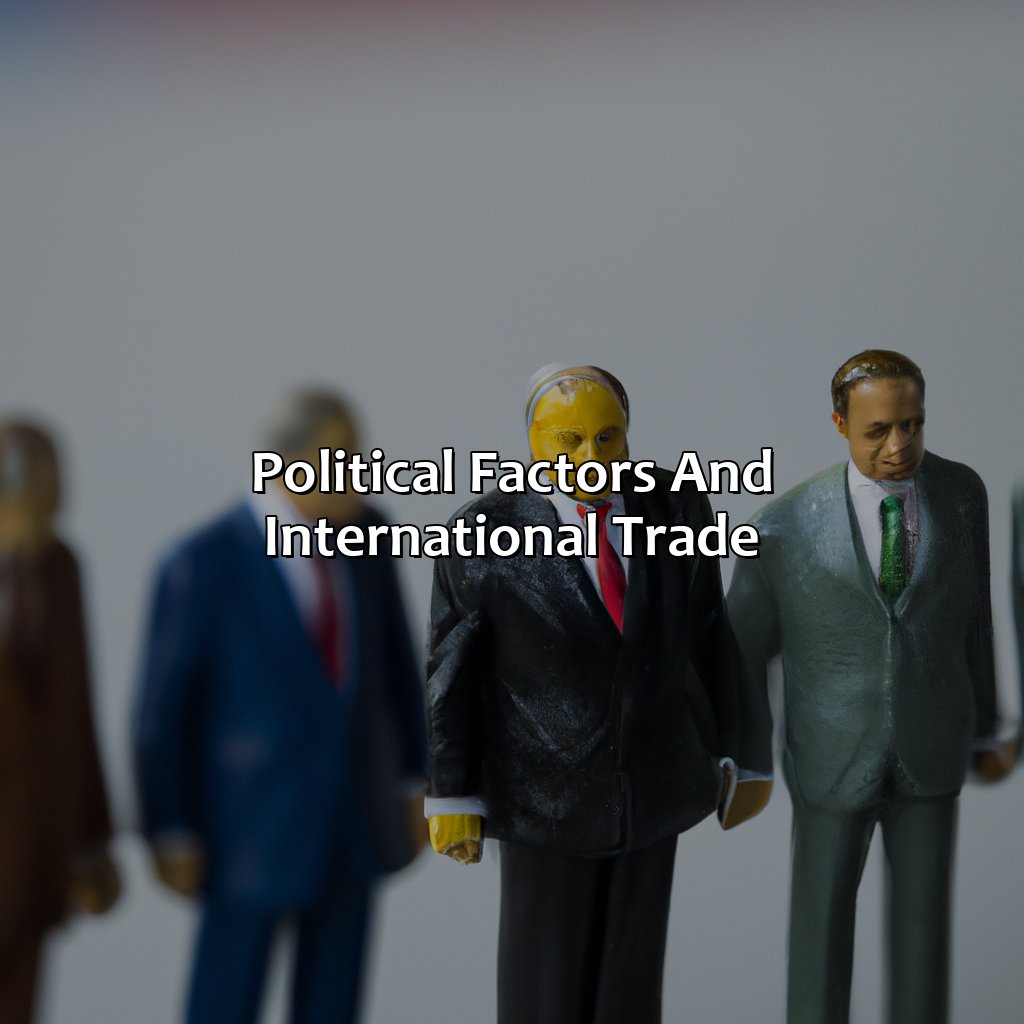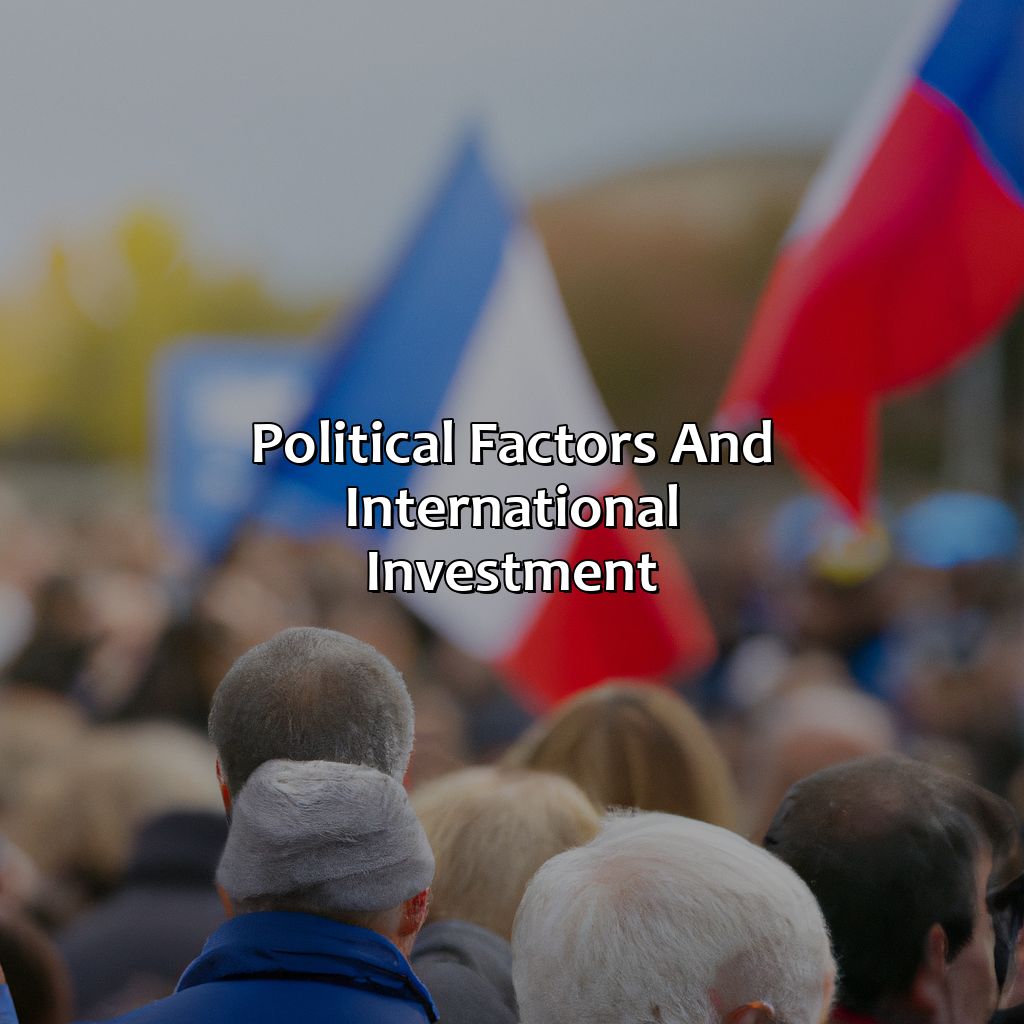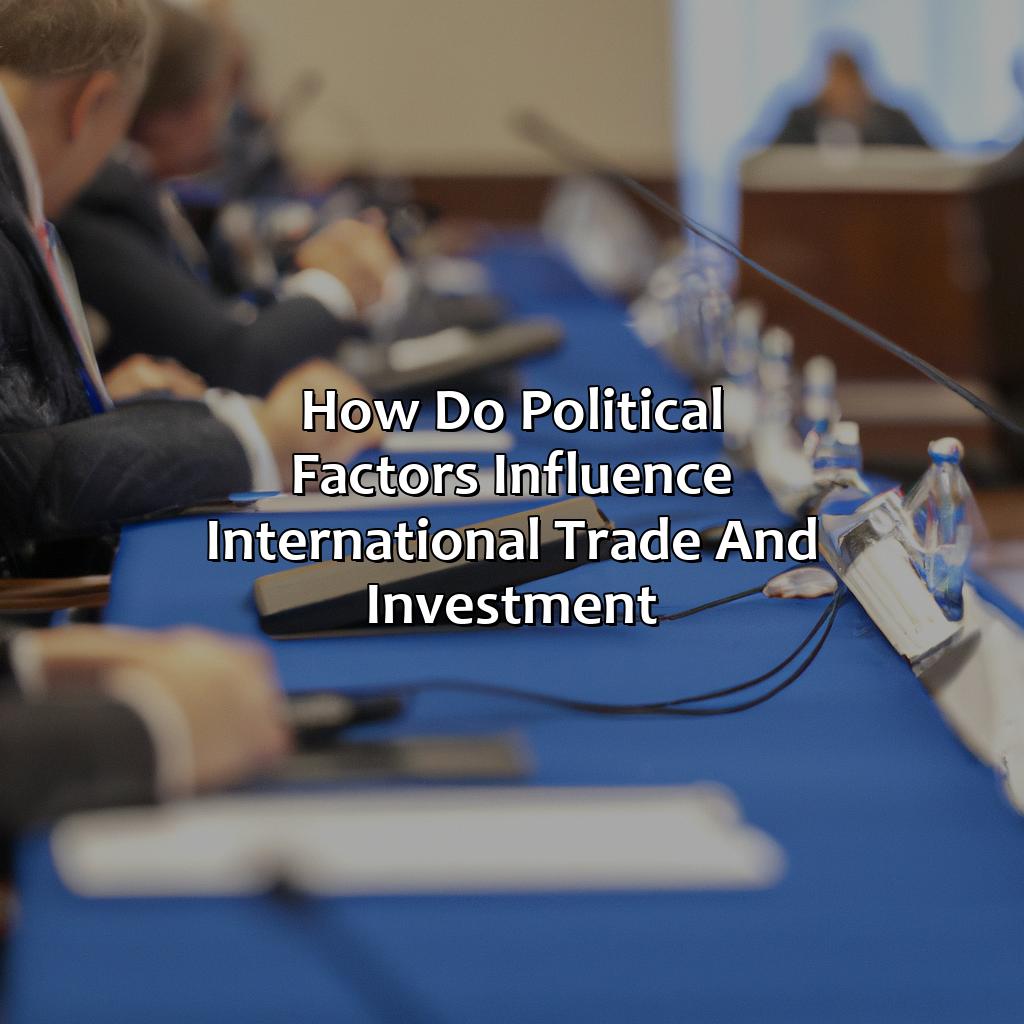How Do Political Factors Influence International Trade And Investment?
Key Takeaway:
- Government policies and regulations can significantly influence international trade and investment. For example, tariffs and quotas can limit the amount of goods that can be imported/exported, while subsidies can provide incentives for businesses to invest in certain countries.
- Political stability is crucial for international trade and investment, as it creates a predictable and secure environment for businesses to operate in. Instability can lead to uncertainty and risk, discouraging investment and hindering trade.
- Foreign policy plays an important role in international investment, as it can either encourage or discourage foreign businesses from investing in a country. For example, favorable tax policies and trade agreements can attract investment, while political tensions can have the opposite effect.
Are you wondering how political factors can affect international trade and investment decisions? This article explores the various political factors that can influence the direction of foreign trade and investment. Learn how to effectively identify and address these political risks to protect your business.
Political Factors and International Trade
To get a grip on political influences on global trade, government policies, regulations, political stability, and political beliefs must be taken into account. In this section, we’ll quickly look at each of these components, helping you to understand how they affect countries engaging in international trade.

Image credits: retiregenz.com by Yuval Jones
Government Policies and Regulations
The legal and regulatory framework set by the government plays a significant role in shaping international trade. Policies established by government agencies on issues such as import/export laws, intellectual property rights, health and safety standards, sustainable development, and labor policies impact the entry of products into a particular market.
Additionally, tariffs, quotas, subsidies, sanctions, and embargoes can be used to protect domestic industries or influence trading partners’ behavior. These policies aim to create more favorable conditions for local businesses while directly or indirectly affecting multinational companies’ operations.
It is crucial to note that countries differ significantly in their legal requirements for conducting international business. Understanding these differences can make it easier for businesses to operate in foreign markets without breaking any laws or regulations.
Many nations enact policies that limit access to specific markets or restrict foreign ownership of local firms. These types of policies require advanced planning and careful consideration before entering a market.
A study by the World Bank found that removing trade barriers could increase global welfare by up to $1 trillion annually. This highlights the potential benefits of easing restrictive government policies and regulations on international trade.
Political stability isn’t just important for a country’s citizens, it’s also crucial for international trade partners who don’t want their investments going up in flames.
Political Stability and Instability
Political stability and instability refer to the level of certainty or uncertainty regarding the government’s ability to maintain societal order, enforce laws and regulations, and protect property rights. In the realm of international trade and investment, political stability in a country can create an attractive environment for foreign investments. Furthermore, it enables investors and businesses to make long-term plans confidently. Conversely, political instability often leads to unfavourable economic conditions either through frequent changes in policies or complete breakdown of law and order.
Countries that experience political stability tends to attract more foreign investment due to reduced risk with investing in the economy. The presence of a stable environment encourages investment by helping lower entry costs through increased access to critical services such as credit, utilities, transportation systems etc. Moreover, consistent governance policies provide companies with relative certainty when making long-term investments decisions.
Conversely, unstable governments pose significant risks for international trade by disrupting economic activities in spheres such as exporting goods or services into international markets; this results in further financial losses for both countries involved. For instance, the civil war in Syria has had an enormous impact on its economy due to the deterioration of infrastructure, devaluation of local currency, reduction in exports amongst others.
In history also we can some cases of political instability impacting international trading relationships resulting in significant economic implications. For example; the stock market crash from 2008-2009 was caused by large losses incurred from risky investments made by banks at that time leading to a chain reaction that destabilized stock prices globally which then impacted trade flows between countries.
Politics and trade are like oil and water, they don’t mix well unless you’re willing to go to war for it.
Political Ideology and International Trade
The relation between political ideology and international trade is significant. It directly influences the trade policies and market entry barriers. The government of a country with left-wing political ideology emphasizes social welfare, public ownership, and regulated markets, while right-wing ideologies prioritize capitalism and private ownership. These ideological differences can affect foreign investment opportunities, trade agreements, and tariffs.
Moreover, countries with different ideologies may have contrasting goals in terms of economic growth, national security, and cultural preservation. Therefore, understanding the political ideology of a particular nation becomes crucial while engaging in international trade and investment. It can help businesses to protect their interests by adapting to the locally available resources to comply with regulations.
One example is China’s socialist-oriented government that since 1978 has been implementing economic reforms by gradually moving toward a liberalized economy. According to the World Bank report on Ease of doing business rankings for 2020 (source), China ranks 31st out of 190 economies globally―showing how socialist economies can balance state control over free-market activities to facilitate international trade.
International investment is a bit like entering a political minefield – you never know when one wrong step could blow up in your face.
Political Factors and International Investment
To get a grasp on political effects on foreign investment, this section investigates:
- Investment regulations and policies,
- Political steadiness and investment, and
- Foreign policy and investment.
These subsections offer individual insights into how politics can shape international investment.

Image credits: retiregenz.com by Harry Washington
Investment Regulations and Policies
The regulations and policies governing investments are crucial to their effectiveness. They influence foreign direct investment and affect the growth of economies. The formulation, implementation, and enforcement of these regulations determine their success or failure.
Investment guidelines determine how firms invest in foreign countries and the protection available to investors. Investment policies provide a framework for managing the political risks involved with investments abroad by establishing laws and regulations that govern foreign trade.
Investment promotion agencies facilitate investment inflows into developing countries by providing assistance to investors. Such organizations help reduce information asymmetries between potential investors and local businesses.
To succeed in international investments, one must identify opportunities early enough and take advantage of them. Failing to do so could lead to missed opportunities or losses that could have serious consequences on the investor’s portfolio.
If you’re looking for stability in politics, it’s best to invest in a lava lamp – at least you know it won’t suddenly change its mind.
Political Stability and Investment
The relationship between political factors and investment is vital for international trade. A country’s political stability directly affects investment opportunities, the success of foreign businesses’ operations, and subsequent economic growth and development.
Political instability at any level can lead to uncertainty in the market, disrupting investments by investors as it makes them hesitant or unwilling to invest due to an unpredictable business climate. Such uncertainties are caused by potential political risks like changes of government, social instability, corruption in government agencies that might create a negative perception of the country’s investment atmosphere, affecting its overall economic prospects.
Countries with stable democracies and governments have long-term policies, established regulations, secure property rights systems and independent judicial systems that offer transparency to investors regarding their financial gains & taxation procedures.
Political stability is necessary for businesses globally setting up shop since it influences the host state’s administrative efficiency and moderation record. According to a report by World Bank and International Finance Corporation (IFC), ‘Doing Business Index 2020’, countries having higher political stability indices tend to give better results concerning contract enforcement upgrades over time.
Investors often find credible information crucial while making decisions on where or how much to invest; thus lessening third-degree information asymmetries via quality data gathering enhances investor confidence across global business sectors.
Foreign policy may be complex, but investing in it is like playing the lottery – you never know if it’ll pay off or end up breaking the bank.
Foreign Policy and Investment
The impact of government policy on foreign investment is significant. Nations need to ensure that their policies are capable of attracting investments from abroad. Unfavorable legal and regulatory regimes, corruption, and unfavorable diplomatic relations can deter foreign investors from investing in a country. This can lead to a decline in inflow of capital and hamper economic growth.
Countries with stable foreign policies are attractive destinations for foreign investment. A positive approach to international relations opens up new business opportunities and partnerships that bring economic benefits to both parties involved. On the other hand, an unstable foreign policy can lead to decreased investor confidence, resulting in lost opportunities for economic cooperation.
It is also important to note that political factors do not only affect investment at the national level but also have a bearing on regional or local economies. Regional stability affects perceived risk levels and vulnerability among investors who might be more cautious, hence impacting daily transactions.
A case in point was the political instability and violence in Zimbabwe which led the country’s economy to stagnate following a period of robust growth in the late 1990s. Investors were discouraged by the lack of rule of law, regulatory irregularities, nationalization policies, and rising debt levels which undermined economic progress in Zimbabwe.
To attract investment from abroad, countries need consistent and predictable regulatory frameworks free from corruption with unwavering respect for private property rights leading towards improvements in infrastructure development, creating transparency into resource allocation mechanisms while protecting intellectual property rights – bringing about conducive ecosystems for long-term business opportunities internationally.
Let’s hope these case studies don’t end up as exhibits in a political circus.
Case Studies
Gain insight into the impact of political factors on international trade and investment by looking at the case studies. Break it down into two parts:
- How politics influences the China-US trade war
- How politics affects UK-EU trade dealings
Real-world examples demonstrate how significant political factors are in international trade and investment.

Image credits: retiregenz.com by David Washington
How Political Factors Affect China-US Trade War
The ongoing trade war between China and the US has been largely influenced by political factors. The imposition of tariffs, restrictions on imports and exports, and other trade-related policies have all been driven by political decisions made by the governments of both countries.
The US has voiced concerns over its trade deficit with China and accused China of unfair trade practices. China, on the other hand, has accused the US of attempting to contain its economic rise. The two nations have engaged in a tit-for-tat tariff battle that has caused significant disruptions to global supply chains and impacted businesses around the world.
One unique factor that affects this trade war is the role played by technology companies in both countries. Chinese tech companies such as Huawei have come under increased scrutiny from the US government due to national security concerns. This has led to bans on trading with Huawei, impacting business relationships between the two countries.
As this situation continues to evolve, it is crucial for businesses around the world to keep up-to-date on developments surrounding this issue. Failure to do so could result in missed opportunities or negative impacts on their current operations.
Stay informed about how political factors are influencing international trade and investment, particularly as it pertains to China-US relations. In today’s volatile global economy, staying ahead of these trends is critical for success.
Why did the UK and EU break up? Political differences and a bad case of ‘Brexit-itis’.
How Political Factors Affect UK-EU Trade Relations
International trade relations between UK and EU are profoundly affected by political factors. It involves various factors such as imposition of tariffs, regulatory policies, border control measures, and changes in currency exchange rates that affect the supply chain networks and economic growth rate. These factors could be either internal or external that arise due to geopolitical risks, populist sentiment, immigration policies, or compliance regulations.
These political factors have a noticeable impact on the export-import activity between the two entities. Countries can impose quotas or restrictions based upon country of origin with respect to imports and exporters can be sanctioned for non-compliance of standards. Political instability and economic uncertainties among countries may create higher import barriers that could lead to loss of opportunities for businesses within Europe.
The European Union has established a single market policy across its members characterized by free trade agreements, harmonized tax regimes and regulations, licensed goods; however Brexit has created uncertainty leading to trade constraints. Additionally, emerging markets outside Europe with favorable regulations could start competing more vigorously against European markets.
Factually speaking it is found that international trade flows depend highly on political stability which facilitates greater negotiation scope for bilateral trade decisions. Therefore a consistent geopolitical environment in the UK will positively influence trade relations resulting in healthy economic growth.
To highlight an example: After 2016 brexit referendum vote there was increased tension in continental Europe with regards to reducing trade imbalances between member states. The bloc developed plans aimed at protecting itself from potential dumping after it was found that steel products were being sold below production costs by state-controlled mills overseas. Shockwaves from Brexit also led China to re-evaluate their steel exports which increased quantities reaching the European market and disrupted competition among regional manufacturers leading to new tariffs imposed by EU member states on Chinese produced goods as preventative measure against polluting industry practices in steel manufacturing abroad.
5 Facts About How Political Factors Influence International Trade and Investment:
Government policies and regulations can significantly affect international trade and investment by creating barriers, such as tariffs or quotas. (Source: WTO)
Political instability in a country can discourage foreign investors and disrupt international trade. (Source: Investopedia)
International trade agreements, such as NAFTA or the EU, are influenced by political factors and can have a significant impact on global trade and investment. (Source: Brookings)
The political climate between countries can affect international trade and investment through sanctions or trade wars. (Source: CNBC)
Political factors, such as corruption or lack of transparency, can create uncertainty and discourage international trade and investment. (Source: OECD)
FAQs about How Do Political Factors Influence International Trade And Investment?
How do political factors influence international trade and investment?
Political factors can significantly impact international trade and investment by affecting the rules, regulations, policies, and operations of businesses across borders.
What are some examples of political factors that affect international trade and investment?
Some examples of political factors that influence international trade and investment include trade agreements, national security concerns, political instability, embargo policies, and foreign investment regulations.
How does political instability in a country affect international trade and investment?
Political instability in a country can create uncertainty, risk, and disruption for businesses operating there, which can discourage foreign trade and investment. This can occur due to factors such as civil unrest, corruption, terrorism, or a lack of governmental stability.
Why do countries establish trade agreements with other nations?
Countries establish trade agreements with other nations to promote economic growth, increase access to new markets, and reduce barriers to trade by eliminating tariffs, quotas, and other trade barriers.
How do government policies impact international trade and investment?
Government policies such as taxation, subsidies, and regulations can significantly impact international trade and investment by affecting the production costs, competitiveness, and profitability of businesses. This, in turn, can affect the prices of goods and services, trade flows, and investment decisions.
What are the potential risks of investing in a politically unstable country?
Investing in a politically unstable country carries a high degree of risk, including expropriation, economic instability, violence, and corruption. It can also lead to reputational damage, brand erosion, and legal challenges for businesses.
 Checkout this IRS Loophole
Checkout this IRS Loophole 
